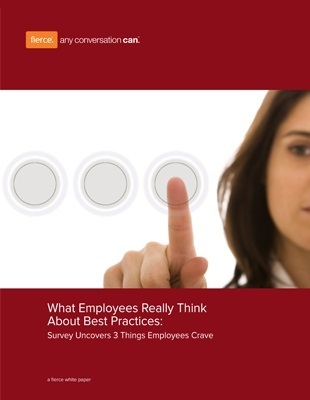Susan Scott's Blog, page 115
June 8, 2012
3 Steps to Embrace Being Confronted
It’s never fun or easy being confronted. For many, our instinct is to deny, defend, or deflect what is being put before us. At Fierce, we believe confrontation conversations are healthy and can be rewarding.
However, it does take skill and practice to ensure the conversation is productive and moving the relationship forward.
Below are three tips to help you achieve this.
#1: Take a Breath and Listen
Whether you saw this conversation coming or not, it is normal to have some physiological reaction to it while it is happening. Take a moment and breathe. Literally, deep breath in, deep breath out. Once you’re grounded, resist the inclination to become defensive and focus on listening. This is not easy to do, yet this conversation could be an amazing opportunity to learn something about yourself.
#2: Take Time with the Process
Give yourself and the person confronting you permission to move through this process slowly. If the person confronting you has told you his or her point of view and you need time to think about what has been said, ask for that time and take it. One of the ultimate goals of having a confrontation conversation is to enrich the relationship. Knee jerk reactions can seriously lessen the chance of this happening.
Once you are ready to engage again, put yourself in a curious mindset and seek to truly understand where this person is coming from. If you’re confused about their point of view – ask questions! Clarify, clarify, and clarify. Repeat back to them what you are hearing and ask for confirmation that it is correct. Digging deeper sets you up to fully participate in the conversation.
#3: Realize You May Need to Take Ownership
A question we ask in our Confrontation Model when prepping to confront someone is to identify your contribution to the problem. While the person confronting you may have had more time to think on this, you are probably processing what your contribution is in real time.
Even though it may happen quickly, it is important to be sincere with this part of the conversation.The only way a conflict can be resolved and the relationship can move forward in a positive way, is if both parties are thoughtful as to how they impacted the situation.
Confrontation conversations are emotionally charged situations, and they are very rarely easy. However, healthy relationships include both confrontation and appreciation.
What other tips do you have when being confronted?
June 6, 2012
Fierce Tip of the Week: Obey Your Instincts
We’ve all experienced having a “gut feeling” during a conversation. It is an instinct that kicks in when we sense that there is something going on that is out of balance with ourselves or our surroundings.
The tip this week is to obey that instinct.
I know that, personally, there have been conversations where I did not obey my instincts and instead chose to ignore them. I kicked myself later for not taking the time or having the courage to explore them. On the flip side, I experience more productive and positive outcomes when I pay attention to those internal messages.
For example, when I sensed that my doctor and I were out of alignment in priorities and philosophies around my pregnancy and impending delivery, I chose to obey my instincts and dig deeper. As a result, I not only found a much better practitioner who was a better fit; I also felt incredibly empowered.
Your “gut” acts as an internal primal compass that, when truly tapped into, can serve as a powerful guide. The best part is that it happens automatically – you simply have to tune in and really listen.
This week, trust your gut, and see how your conversations shift.
June 4, 2012
Investing in Conversations
Each month, Fierce contributes to the Learning Forward blog hosted by Education Week. Director of Fierce in the Schools, Janet Irving, wrote our newest piece which was published today, and we wanted to share a portion of the blog with you.
Conversations are the life blood of a school. An integral part of the educator’s job is communicating with students, parents, and other staff. These conversations range from team curriculum meetings, coaching conversations with staff and students, and, of course, some confrontation conversations.
Parents, students, and community members all have an expectation that administrators and teachers know how to have these conversations well. Why do we make this assumption? Because intuitively we understand how important effective conversations are to the success of a school.
The problem is that many education institutions don’t dedicate time or resources to the development of staff in the area of communication. Schools have limited time and funds, and other professional development priorities often take precedence.
To read Janet’s full blog post on Education Week click here.
To read all of Learning Forward’s blog posts, go to http://blogs.edweek.org/edweek/learning_forwards_pd_watch/
May 30, 2012
Fierce Tip of the Week: Be Generous in Your Conversations
There are so many ways to practice generosity in your conversations. You can be generous with your time, your attitude, your knowledge, and you can direct this effort towards others, and even toward yourself.
Generosity is a component of one of the Four Objectives of a Fierce Conversation: Enrich the Relationship. Being a generous conversationalist shows you are invested in the relationship and leave people feeling positive about your interactions, even if what you discussed was difficult or confrontational.
Showing generosity is also personally rewarding – it can encourage you to explore new people and subjects you may know very little about.
For example, this week I had the opportunity to speak with a young soon-to-be college graduate who was curious about leadership development and life outside of academia. She was motivated enough to ask to speak with someone and I really respected that.
I practiced being generous by blocking out time for the call amidst a crazy schedule. I also worked to be fully present and really listen. As a reward I was able to connect with a really intelligent young woman who I hope to keep in touch with!
How can you practice being generous in your conversations this week?
May 25, 2012
A Thank You to Veterans: Honor Memorial Day with Meaningful Conversations
Memorial Day in the United States is upon us, and while many of us enjoy the long weekend with family time and fun barbeques it is about something bigger.
One way we can honor those who have served our country and sacrificed their lives is to have conversations that are meaningful and express gratitude with our friends and loved ones who are still here with us.
Outside of the United States, other countries have their time as well to honor their fallen heroes who have courageously sacrificed their lives. Universally we share this desire to say thank you.
Do not shy away from what this holiday is about. There is real opportunity to engage in conversations with others about sacrifice, courage, and death. If your family has lost a loved one, it is powerful to remember them through conversation.
Sharing our fallen veterans’ stories to a whole new generation is how we keep memories alive. Take the time to fully engage in those conversations even if it is a difficult and tender topic.
We at Fierce would like to take this moment to say thank you to those who have served in our armed forces and to their families who will be celebrating with this weekend.
We would also love to hear from you: how are you going to honor Memorial Day?
May 23, 2012
How to Take Responsibility for Your Conversations
There is no trivial comment for leaders. I would also argue: for anyone. How you show up and what you say have impact.
Your actions and conversations are monitored at all times by those you work with. The upside of that is you have great ability to influence change and your culture.
Nobody is perfect, and your co-workers shouldn’t expect you to be. However, not fully owning your conversations will quickly produce an environment of low morale and engagement.
If you’re having a bad day and you show up at a meeting with a bad attitude, that will be noticed, talked about, and internalized by those around you. Have multiple bad days in a row, and you can watch people quickly disengage from you.
Below are three steps you can take to help you more fully own your conversations.
Step 1: Obey your Instincts
Want to build emotional capital with people really quickly? Then obey your instincts. Take the example above. If you leave the meeting knowing you just showed up in a way that you would never tolerate from someone else on your team, contact those who were there and apologize. It’s that simple, and there is no need to go into detail about why.
If your attitude was because you were unhappy with your team, take this opportunity to address the issue head on and reschedule another meeting to discuss what was bothering you.
Step 2: Master the Courage to Interrogate Reality
Is communication not something you feel totally comfortable with? Many don’t. Maybe you need to continue to develop your communication skills. Reach out to others within your organization and see what training your company is offering, or spearhead bringing training in yourself if it’s not available.
Leaders in companies, regardless of titles, recognize their own strengths and weaknesses and set out to help improve them. Make your job easier by paying attention to how effective your conversations are, and if you need help, do something about it.
Step 3: Take Responsibility for Your Emotional Wake
Part of being a leader is developing your emotional intelligence. One of the ways you do that is to take responsibility for your emotional wake. Dr. Albert Mehrabian’s pioneering research on human communication tells us that only 7% of how we communicate is the words we say, 38% is tone of voice and 55% of communication is non-verbal.
Meaning, even when you’re not speaking, you’re conveying something. Being aware that you are doing this can be a challenge. When you do take notice, it doesn’t stop there. To make sure you aren’t infecting your culture with a lingering wake, check in with people. Also, when you catch yourself putting something out there that isn’t productive, address it right away.
How do you take responsibility with your conversations?
May 21, 2012
Fierce Tip of the Week: Come Out From Behind Yourself, Into the Conversation and Make It Real
Fierce is not a neutral word.
It can evoke a strong emotion, especially when you ask people to make their conversations fierce.
We define a Fierce Conversation as one in which you come out from behind yourself, into the conversation and make it real.
We live in a culture where we filter most of our conversations, and because of that they remain surface level. A Fierce Conversation encourages you to switch from this surface mentality and instead get more engaged.
What we mean by this is to bring more of yourself to the conversation by peeling off the masks you may wear around certain topics – this doesn’t mean it’s always about having long conversations or inappropriate disclosure.
Rather focus the time you have on making your conversations count. Remember that one of the Four Objectives of a Fierce conversation is to enrich the relationship.
This week observe the interactions you’re having with others and take note of moments where you may not be fully showing up, whatever the reason may be.
Challenge yourself to get involved in your conversations.
Build on the momentum of last two Fierce Tips of the week: Let Silence Do the Heavy Lifting, and Be Here Prepared to be Nowhere Else. These are both principles of a Fierce Conversation and can help you take that next step in being more present and authentic.
Listen to yourself, if you feel like you’re holding back – you probably are.
May 18, 2012
New Report: What Employees Really Think About Best Practices
We’re pleased to share with you a new Fierce, Inc. report that shows while best practices are intended to support employees, new survey results reveal a dramatic disconnect.
Fierce polled nearly 800 corporate executives, employees, and educators across the finance, healthcare, retail, aerospace, and defense sectors where they responded to an online survey conducted in February 2012.
What Employees Really Think About Best Practices: Survey Uncovers 3 Things Employees Really Crave, now available for complimentary download, breaks down the survey results and uncovers the top 3 things relevant to employees.
In this whitepaper we reveal:
• The difference between official truths (how organizations talk about themselves) and ground truths (how organizations talk amongst themselves)
• Three key things employees want to see more of in the workplace
• How to ensure best practices remain relevant
To learn more, download your complimentary copy of What Employees Really Think About Best Practices: Survey Uncovers 3 Things Employees Really Crave, now.
May 16, 2012
How to Make Time Management Less of an Issue for Leaders
If you were asked what made your job harder, would you answer that there’s never enough time?
This is a common theme we hear. Leaders within organizations are constantly faced with the challenge of managing their time. Pulled between the responsibility of producing and helping support those they lead; leaders often look up at their clocks and realize the day is almost over, and they haven’t checked one thing off their to-do list.
This is not just frustrating, it burns people out.
So what is there to do?
First, make your to-do list manageable. In the Fierce Delegation Model, we make it simple by creating a Five Things To Do check-list. Write down five things that you need to do, not everything on your plate, just five. Aim to have them completed by noon and if they’re not, don’t go home until there all checked off. Write down your next five things before you leave for the night, so you’re focused when you come in.
Second step is to make time to complete your list! I mean physically block time out on your calendar. If your goal is to have your items finished by noon, don’t accept appointments from 10-12. Learn to say no. Give yourself permission to own your time and use it effectively. This will make you a stronger leader because when you’re in meetings with others you won’t be thinking about everything else you need to get done! Effective time management helps you practice the Fierce tip of the week: be here, prepared to be nowhere else.
Thirdly, recruit help from others. You are not the only leader whose time is being eaten up by putting out fires, or overloading yourself with too many things on your checklist. Like trying anything new, having a buddy helps keep you on track. You help hold each other able.
Lastly, spread the wealth. If you have too much on your plate – delegate. Delegate to develop those around you, not just to get the things you don’t want to do off your plate. This will ensure delegating and dispersing responsibilities will be eagerly welcomed by your team.
Time is precious, and there will always be more to do. Being an effective leader requires you to take charge of your calendar and use every moment the best way possible. Your sanity and your team will thank you for it.
Is time management an issue for you as a leader?
May 14, 2012
Fierce Tip: Be Here, Prepared To Be Nowhere Else
This week when you engage with others try to focus only on the people in front of you and let go of the distractions around you.
Think about what makes a conversation rewarding. For me, there is nothing quite like an attentive listener.
What Fierce principle can you practice to become more attentive? Be here, prepared to be nowhere else.
People can tell when you really stop listening. When your mind leaves the conversation at hand and begins to run through a to-do list or drifts to a looming deadline, that lack of presence manifests itself physically.
It’s obvious when you do this, and if done repeatedly, it can send the message that you don’t care enough about what others are saying to stop being distracted.
Don’t put yourself or those you communicate with in the position to make these kinds of assumptions. The last thing you want is for others to end a conversation with you wondering: did they really listen or care about what I had to say?
Instead, when you engage in a conversation focus on being present. Then practice staying present by being mindful of when your mind wonders away from the person in front of you.
Those around you will notice!
Susan Scott's Blog
- Susan Scott's profile
- 861 followers












